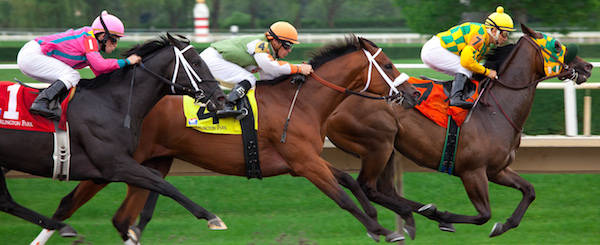Betting and horses go together like two degenerate peas in a pod. I wrote about this yesterday in our post on how to understand gambling on horse races. Once you’ve picked up the basic elements of any new skill, the first thing to do is to test it in a real world situation. In the realm of gambling, that often means losing lots of money. A great alternative is to watch a race with an experienced gambler and make some imaginary bets with her so she can tally up your winnings/losings at the end to see what you would have won or more likely lost. If you’re like me, you might not be able to find an experienced gambler. The only ones I know are characters in a musical… so I figured, why not test our knowledge on them??!
I’ve annotated the lyrics to one of the great horse racing songs of all time, Fugue for Tinhorns from the musical Guys and Dolls. Each singer’s line goes in and out, but to simplify things, I’ve stuck with the loudest. The guy in the center, who starts the song is improbably named Nicely-Nicely Johnson. The shorter man who prefers the horse, Valentine, is Benny Southstreet and the third man is Rusty Charlie. Listen to the song and see if you can decipher all of the horse racing betting terms. If you need help, look at the annotated lyrics below.
I got the horse right here.
The name is Paul Revere and here’s a guy that says if the weather’s clear,
can do, can do. This guy says the horse can do.
If he says the horse can do, can do, can do.
You other two guys should listen to me, because I know which horse is going to win. His name is Paul Revere and I have received information suggesting that as long as it doesn’t rain (some horses run better on a wet racetrack than others) he should win.I’m picking Valentine, ’cause on the morning line,
the guy has got him figured at five to nine.
I’m ignoring your advice and betting on a horse named Valentine. His odds are 5/9 which means that if the race were run 14 times, he should win nine times or 64% of the time. That’s a big favorite, no wonder the little guy in the grey hat wants to bet on him.But look at Epitaph, he wins it by a half,
according to this here in the Telegraph.
Rusty Charlie prefers a horse named Epitaph whose odds he does not quote but who the horse racing tout (columnist who predicts the outcome of races) in a New York City newspaper claims will win.For Paul Revere I’ll bite, I hear his foot’s all right.
Of course it all depends if it rained last night.
Nicely-Nicely remains determined to go with his initial horse, although he’s still a bit nervous about the weather. And now a new concern, the health of the horse’s foot has cropped up. I’m not sure our friend here is the most convincing.I know it’s Valentine, the morning work looks fine,
you know the jockey’s brother’s a friend of mine.
Benny is always looking for an edge and he thinks he’s got some valuable inside information. The “morning work” would be a pre-race workout the horses run. Despite this exercise being likely closed to the public, real gamblers like these guys have connections, like the brother of Valentine’s jockey or rider for the day.Just a minute boys. I got the feed box noise,
it says the great grandfather was Equipoise.
I wasn’t positive what “feed box noise” was but this guy on Answers.com argues fairly convincingly that it’s slang for scuttlebutt or gossip that people would have traded around the horse’s feed box. That makes sense to me. The internet was also helpful in teaching me that Equipoise was a famous horse who raced in the early 1930s. A horse’s genealogy, often referred to as its bloodlines, is of intense interest to gamblers, who generally feel as if specific characteristics like a desire to run, a willingness to obey the jockey, or a dislike for being hemmed in by other horses are passed down from one horse to another over generations.I told you Paul Revere, now this is no bum steer,
it’s from a handicapper that’s real sincere.
Poor Nicely-Nicely. He’s still trying to convince the other two that his advice (steer) is good or at least not bad (bum). His argument is that the handicapper (tout, horse racing prognosticator) is sincere. Which seems like just a terrible argument to me. Who cares about sincerity? What we need is accuracy!I’m picking Valentine, ’cause on the morning line,
the guy has got him figured at five to nine.
Benny is sticking to his guns.So make it Epitaph, he wins it by a half,
according to this here in the Telegraph.
As is Rusty!Epitaph. Valentine. Paul Revere.
I got the horse right here!
Thanks for reading and good luck,
Ezra Fischer


Wow! Thanks for the interpretation of this great song! Fun post!